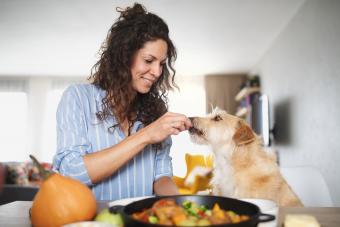
Adding vegetables to your dog's diet is a great way to help them get added nutrients, fiber, and antioxidants, but you need to be careful about which ones you offer them. Not all veggies are safe for canines. Along with a comprehensive list of all the vegetables dogs can eat, we've included which ones you should only offer in moderation and which ones you must definitely avoid to keep your pup safe.
Vegetables Dogs Can Eat
Several vegetables are both safe for dogs and have a lot of health benefits.
- Bell peppers: Packed with antioxidants and vitamins C, A, and E
- Broccoli: Loaded with potassium and vitamins K and C
- Brussel sprouts: Rich in fiber.
- Cabbage: Contains fiber, magnesium, and beta-carotene
- Carrots: High levels of beta-carotene, phosphorus, and vitamins A and C
- Cauliflower: Packed with fiber and vitamin C
- Celery: High in vitamins A, C, and K
- Corn: Contains vitamin E and fiber
- Cucumbers: Low in calories and contain antioxidants
- Green beans: Loaded with fiber, folic acid, and iron.
- Lettuce: Low in calories and contains vitamins C, A, and K
- Mushrooms: Full of amino acids and B vitamins
- Peas: Packed with protein and antioxidants
- Potatoes: High in fiber, folate, and potassium
- Pumpkin: Excellent source of antioxidants, carotenoids, and vitamin C.
- Snap peas: Loaded with B vitamins and vitamin K
- Squash: High levels of vitamins E, A, and C
- Sweet potatoes: Rich in carotenoids and vitamin A
- Tomatoes: Contains fiber and antioxidants
- Yams: Full of fiber and vitamins C and A
- Zucchini: Rich in antioxidants, folate, and B-12
Veggies make great low-calorie treats. Just make sure you cut them up in to small, bite-sized pieces, especially if your dog is older and can't chew as well as they used to.
How Much Can They Eat?
Too much of anything, even healthy food like vegetables, can upset your dog's stomach or make them sick. Always introduce veggies to their diet slowly to keep from overwhelming their gut. Too much fiber can cause diarrhea or stomach upset, and cruciferous vegetables like broccoli, cabbage, and cauliflower can make your dog super gassy.
Aim to keep treats (yes, even vegetables!) under 10 percent of your dog's caloric intake. This is known as the "10% Rule."

Feed With Caution
A few vegetables aren't necessarily dangerous to dogs, but also shouldn't be fed frequently. Use caution when feeding your pup these veggies:
Garlic
There are differing views on whether garlic is actually safe or toxic for dogs. Many experts suggest avoiding garlic because it can have negative effects on a dog's red blood cells, whereas others praise garlic's antiparasitic and anticarcinogenic effects, and its other health properties. Speak to your veterinarian and do your own research to decide for yourself.
Recent research has concluded that aged garlic extract is not dangerous for dogs, and may even provide health benefits when provided in the correct dosage.
Spinach
Spinach isn't the best vegetable for dogs. It contains natural compounds called oxalates, which can damage their kidneys in large amounts. It should be fine to give them a little bit of spinach now and then, but avoid feeding your dog large volumes of this leafy veggie. However, if your dog has kidney or bladder problems, definitely stay away from spinach.
Avoid giving dogs with diabetes or overweight dogs veggies that are high in sugar, such as carrots or sweet potatoes.
Vegetables Dogs Can't Eat
A few vegetables are toxic to dogs and should be avoided entirely.
- Avocado: All parts of avocado contain a compound called persin, which is toxic to dogs.
- Chives: Chives can damage a dog's red blood cells when ingested.
- Kale: The calcium oxalate in kale can damage a dog's kidneys.
- Leeks: Leeks cause the red blood cells to rupture.
- Onion: Contains a toxic substance called N-propyl disulfide, which causes anemia.
- Shallots: Like other veggies in the Allium family (leeks, onions, chives), shallots affect the red blood cells.
- Wild mushrooms: Many wild mushroom varieties are poisonous to dogs.

How to Prep Veggies for Dogs
Prepping vegetables for your dog isn't difficult. Just be mindful of chopping their veggies into bite-sized pieces to prevent choking. Most vegetables are safe to feed raw, with the exception of winter squash, potatoes, and yams.
You can also steam, blanch, boil, or saute veggies for your dog. Don't use seasoning, oil, or butter during cooking; these additions don't make a huge difference in taste to your dog, but they can add unnecessary calories and/or upset their stomach. And make sure the veggies are cooled to room temperature before offering them to your pup.
What to Do if Your Dog Eats Toxic Vegetables
If you discover that your dog ate a small or large portion of a toxic vegetable, time is of the essence. Head to your local veterinary hospital right away, so they can start treatment immediately. Depending on how long ago the vegetable was ingested, they might induce vomiting, run blood work, and even hospitalize your dog. If it's after hours, call the Pet Poison Helpline. They're available 24/7 and can advise you on the next steps to help your dog.
Turn Up the Beet on Veggies for Dogs
Vegetables carry numerous health benefits that can help your dog live a long, happy life. Just be sure to introduce each veggie into their diet slowly to learn how it affects their digestive system and always feed in moderation.







